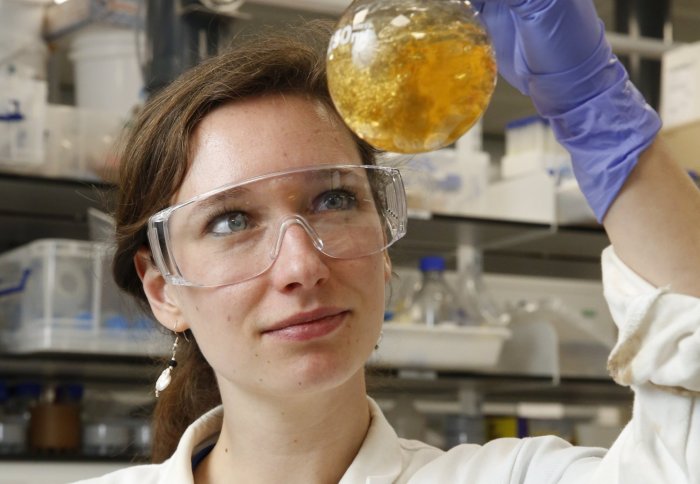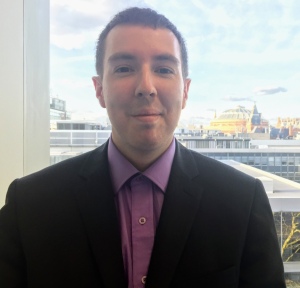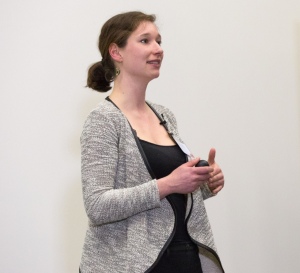How Imperial is boosting vibrant, research-led startups

Dr Florence Gschwend, one of the Techcelerate participants
A new Imperial programme is helping postdocs fast-track the commercialisation of their discoveries, ideas and inventions.
Techcelerate is a new initiative run through Imperial’s Enterprise Lab, working in close partnership with the Corporate Partnerships and Academic and Technology Ventures teams. It helps early career researchers hone their entrepreneurial skills and explore the commercial potential of their research.

The Techcelerate cohort
It is the first Imperial initiative of this kind to be tailored specifically for the needs of postdocs, and aims to help participants bridge the gap between their research and its real world impact.
Developed using industry best practice, it provides up to £30k funding to cover their salary for the 3-month duration of the programme and to fund all customer development activities, as well as access to expert business advisors, coaches and entrepreneurial role models.
Biotechnology innovations
Dr Richard Kelwick, a postdoc from the Department of Medicine, is exploring a possible new therapeutic market for cell-free biotechnology.

Dr Richard Kelwick
Cell-free biotechnology is a new type of biological engineering which involves breaking open cells and freeing their inner workings, which includes the cellular machinery needed to make proteins.
These cell-free systems can then be programmed using engineered DNA to produce specific useful proteins, natural products, biomaterials and chemicals – some which are difficult to manufacture using conventional cell-based systems.
Dr Kelwick is developing cell-free biotechnologies that can be used to rapidly manufacture and prototype various kinds of antibodies – a diverse family of proteins responsible for helping humans fight infections, and which can have powerful therapeutic uses.
Dr Kelwick explained: “Using cells to prototype different proteins to establish the best variant can sometimes be a slow and cumbersome process. Furthermore, cell-free systems can be used to manufacture many types of useful proteins that cannot be easily made in living cells.”
“I’ve always considered myself to be entrepreneurial, and Techcelerate is providing me with the dedicated time and resources to robustly explore the best therapeutic opportunity for the technology and to build a compelling businesses model.”
Smart houses
Dr Deborah Adkins, a postdoc from the Dyson School of Design Engineering is exploring a project called HOUSE, which helps determine what sort of retrofitting is needed to improve a home’s energy efficiency.

Dr Deborah Adkins with HOUSE at an Imperial event
Retrofitted home improvements can be a cost-effective way of improving outdated house designs and reducing their impact on the environment, Dr Adkins explains. But deciding what improvements can be made is a complex process as different buildings, locations, and occupants need different approaches.
She said: “There’s no one size fits all approach when it comes to retrofitting a home. What works for one house won’t necessarily work for another.

HOUSE
“HOUSE creates an interactive physical model of a home that can be used to test out different solutions and determine the best way to reduce energy costs and consumption.
“It looks at the problem holistically – taking into account everything from the best kind of insulation to use, to the effect of filling your kettle a little less high.”
Sweet solutions
Dr Daniel Malko, a postdoc from the Department of Chemistry, has co-founded a start-up called SweetGen with Dr Javier Rubio-Garcia and Professor Anthony Kucernak. SweetGen is developing an innovative fuel cell that is capable of consuming organic molecules present in waste water - such as sugars - to generate electrical energy.
The device would enable faster, lower cost and less energy intensive water treatment procedures for industrial sites such as breweries or agriculture facilities, where water with a high concentration of organic contaminants is produced.
The energy produced from this process could be then used to power the plant, helping reduce costs further.
Dr Malco said: “The Techcelerate Programme is helping me to focus my mind on discovery and innovation. It is very customer-oriented, and we are encouraged to constantly think about who our end users are and what they need. This is incredibly useful in terms of establishing how a technology you’ve developed in a lab can be best put to use in the real world, and where a potential market might be.”
New types of energy
Dr Florence Gschwend, a postdoc from the Department of Chemical Engineering, is researching new chemical processes to treat and transform waste wood into sustainable fuel, new materials, and chemical products.

Dr Florence Gschwend during the 2016 WEInnovate@Imperial final
Wood used in the construction industry is often contaminated with metals - such as copper, arsenic or chromium. These metals come from preservatives added to the wood to prevent them rotting away during use. Unfortunately it also makes the wood impossible to recycle and difficult to dispose of.
The wood can also only incinerated by special boilers, to avoid the release of toxic material. As such, it often ends up in a landfill.
Dr Gschwend is working on an innovative process which can remove the metals from wood whilst separating the wood into useful components to make other products and materials.
She has already founded a start-up - Chrysalix Technologies – based on her research. As a PhD student, she won a prize of £10,000 in the WEInnovate@Imperial programme (formerly known as the Althea-Imperial programme).
She said: “Techcelerate has a cohort of talented postdocs with incredibly diverse business ideas. We’re all at different stages of development and we can learn a lot from each other.”
The Techcelerate participants will be showcasing their ventures at an Enterprise Week showcase event on Friday 23 March.
Article text (excluding photos or graphics) © Imperial College London.
Photos and graphics subject to third party copyright used with permission or © Imperial College London.
Reporter
Deborah Evanson
Communications Division